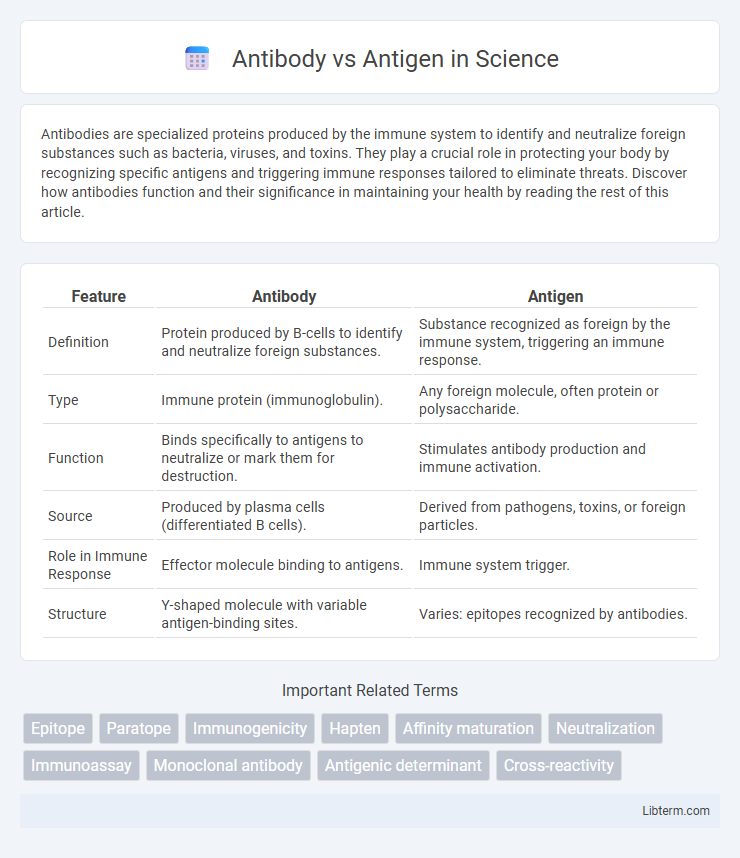Antibodies are specialized proteins produced by the immune system to identify and neutralize foreign substances such as bacteria, viruses, and toxins. They play a crucial role in protecting your body by recognizing specific antigens and triggering immune responses tailored to eliminate threats. Discover how antibodies function and their significance in maintaining your health by reading the rest of this article.
Table of Comparison
| Feature | Antibody | Antigen |
|---|---|---|
| Definition | Protein produced by B-cells to identify and neutralize foreign substances. | Substance recognized as foreign by the immune system, triggering an immune response. |
| Type | Immune protein (immunoglobulin). | Any foreign molecule, often protein or polysaccharide. |
| Function | Binds specifically to antigens to neutralize or mark them for destruction. | Stimulates antibody production and immune activation. |
| Source | Produced by plasma cells (differentiated B cells). | Derived from pathogens, toxins, or foreign particles. |
| Role in Immune Response | Effector molecule binding to antigens. | Immune system trigger. |
| Structure | Y-shaped molecule with variable antigen-binding sites. | Varies: epitopes recognized by antibodies. |
Introduction to Antibodies and Antigens
Antibodies are specialized proteins produced by B cells of the immune system to identify and neutralize foreign substances called antigens, which include pathogens like viruses and bacteria. Antigens are molecular structures, often proteins or polysaccharides on the surface of pathogens, that trigger an immune response by being recognized as non-self. The interaction between antibodies and antigens is highly specific, enabling the immune system to target and eliminate infectious agents effectively.
Definition of Antibodies
Antibodies, also known as immunoglobulins, are specialized Y-shaped proteins produced by B cells in response to foreign substances called antigens. They specifically recognize and bind to antigens, such as pathogens or toxins, to neutralize or mark them for destruction by the immune system. The variable region of antibodies enables precise targeting, making them essential components in immune defense and diagnostic applications.
Definition of Antigens
Antigens are molecules or molecular structures, often proteins or polysaccharides, found on the surface of pathogens such as bacteria, viruses, and fungi, which trigger an immune response in the body. These foreign substances are recognized by the immune system as non-self, prompting the production of specific antibodies to neutralize or eliminate the threat. Each antigen has unique epitopes that bind specifically to corresponding antibodies, facilitating targeted immune defense.
Structural Differences Between Antibody and Antigen
Antibodies are Y-shaped glycoproteins composed of two heavy and two light chains with variable and constant regions, enabling specific antigen binding. Antigens are diverse molecules, often proteins or polysaccharides, with exposed epitopes recognized by antibody variable regions. The structural complementarity between the antibody's antigen-binding site and the antigen's epitope facilitates high specificity in immune recognition.
How Antibodies Recognize Antigens
Antibodies recognize antigens through highly specific binding sites called paratopes, which interact with unique regions on the antigen known as epitopes. This specificity is determined by the antibody's variable regions, which undergo genetic rearrangement to create diverse structures capable of binding a vast array of antigens. The antigen-antibody interaction relies on non-covalent forces such as hydrogen bonds, electrostatic interactions, and van der Waals forces, enabling precise immune recognition and targeting.
Functions of Antibodies in the Immune System
Antibodies play a crucial role in the immune system by specifically recognizing and binding to antigens, which are foreign molecules such as pathogens or toxins. Their primary functions include neutralizing viruses and bacteria, marking infected cells for destruction by immune cells through opsonization, and activating the complement system to enhance pathogen elimination. This targeted response helps prevent the spread of infections and facilitates the adaptive immune system's memory formation for faster future responses.
Role of Antigens in Triggering Immune Response
Antigens are molecules or molecular structures recognized by the immune system as foreign, initiating a targeted immune response by activating lymphocytes and antibodies. These substances, commonly proteins or polysaccharides found on the surface of pathogens like bacteria and viruses, bind to specific receptors on immune cells, signaling the presence of an invader. This antigen recognition is crucial for the activation and proliferation of B cells and T cells, leading to the production of antibodies and the establishment of immunological memory.
Key Differences Between Antibody and Antigen
Antibodies are immune proteins produced by B cells that specifically bind to antigens, which are foreign substances like pathogens or toxins that trigger an immune response. Antigens serve as the target molecules that antibodies recognize and neutralize through high-affinity binding. The primary difference lies in function: antigens invoke immunity by being recognized, while antibodies execute immune defense by binding and facilitating pathogen elimination.
Diagnostic Applications: Antibody vs Antigen Tests
Antibody tests detect the immune response generated by antibodies specific to an antigen, indicating past exposure or infection, whereas antigen tests identify the presence of viral proteins, signaling an active infection. Antibody tests are valuable for assessing immunity or previous infections in epidemiological studies, while antigen tests provide rapid, point-of-care diagnostic results crucial for early detection and isolation of contagious individuals. The sensitivity and specificity vary between tests; antigen tests generally offer faster results but lower sensitivity compared to the more accurate antibody assays used for serological surveillance.
Conclusion: Importance in Immunology
Antibodies and antigens play crucial roles in immunology by enabling the immune system to recognize and neutralize pathogens. Antibodies, produced by B cells, specifically bind to antigens, which are foreign molecules that trigger immune responses. Understanding their interaction is fundamental for vaccine development, diagnostic tests, and therapeutic interventions targeting infectious diseases and immune disorders.
Antibody Infographic

 libterm.com
libterm.com